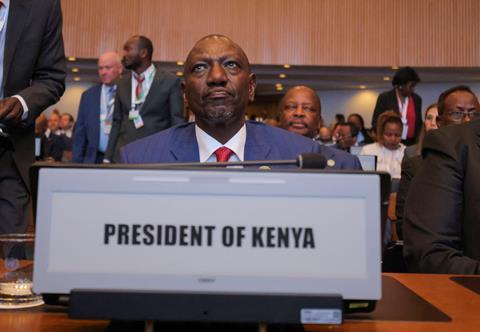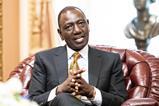Some evangelical leaders in Kenya have backed President William Ruto’s plan to construct a new 8,000-seat chapel at the presidential residence. But other denominations have been highly critical. Daniel Sitole reports

Proposals by Kenya’s President William Ruto to construct a lavish church at the presidential residence in Nairobi have come under heavy criticism.
The 8,000 person capacity building is set to cost 1.2 billion Kenya Shillings (£7 million).
The Anglican Church of Kenya (ACK), the Kenya Conference of Catholic Bishops (KCCB) and others have voiced their concerns. Meanwhile, Muslim groups have asked if the president will also build a mosque for them in the State House.
“The church is a sanctuary to worship God and separate from unholy use, because it represents God’s kingdom. Which kingdom does the State House church represent?” asked The ACK Archbishop Dr Jackson Ole Sapit
The unapologetic president has said he is building the church using his own money. “I am not going to seek apologies from anyone for building a church for God. If the devil gets annoyed, let him do whatever he wants,” he said.
“This will not cost the government of Kenya a single penny. I will build it with my own money,” he stated.
Days later, the President hosted hundreds of evangelical clergy from the Federation of Evangelical and Indigenous Christian Churches of Kenya for prayers. During the meeting, the evangelicals gathered voiced their support for the church, and said those opposing the construction are anti-Christ.
Bishop Samuel Ngacha, one of the lead clergy in the meeting, castigated those opposed to the State House church. He questioned their sincerity, adding that they are the same clergy who frequented the State House to pray for the colonial governor, before Kenya’s independence in 1963.
“Let us allow noise makers to continue. But if some people do not appreciate an altar in the State House, and claim to be born again, they are anti-Christ,” Bishop Ngacha said.
A controversial leader
President Ruto has enjoyed widespread support from evangelicals. Many evangelical leaders campaigned and prayed for him during his bid to become president.
The president’s policy of bottom-up economic transformation made him attractive to poorer communities. He pledged to lower the cost of living, fight corruption, and introduce other measures favourable to the poor within his first 100 days in power.
Critics says that after winning in 2022, the president detached himself from his initial backers in favour of the rich. He failed to implement the 100-day pledges, and instead introduced punitive taxes and policies directly affecting the church and the poor on whose platform he campaigned, they say.
There have since been allegations that Ruto’s government has even turned to harassment, abductions, extra judicial killings and forced disappearance of the youth. Clergy, lawyers, human rights defenders and western diplomats, including from the UK, US and Canada have condemned this.
Now, some of his key evangelical allies say they’ve felt cheated.
Rev Teresia Wairimu who founded Faith Evangelistic Ministries, a growing evangelical church in Kenya, with branches in the UK and US lamented the turn of events, saying the government of President Ruto was not from God as she earlier believed.
“The current administration was not God-given,” said Rev Wairimu. “I have always thought that this is a government of God, because we voted for it. To our embarrassment, this is a government of fights.”
The State House is not a private property of the president and it belongs to all of us people of Kenya
“As a voter, I am embarrassed. We want development, we want performance. Don’t arm yourself as if you are going to war, but as if you want to serve the nation and the people who voted for you,” Wairimu told the president.
Bishop Margaret Wanjiru is a politician and founder of the Jesus is Alive Ministries, and also a founder member of Dr Ruto’s party, the United Democratic Alliance (UDA).
She is among evangelical clergy who actively campaigned for Dr Ruto and his party. But after police raided and demolished part of her church in March 2024 she hit back, saying the police physically assaulted and humiliated her in front of her followers and staff and she suffered multiple injuries. “I was beaten, my clothes lifted up by young policemen, they touched my thighs and stole my mobile phone,” Bishop Wanjiru added.
Now, many clergy do not want the president to continue building the church in the State House. But is it the church they do not want, or the president?
Lawyer Tony Barasa says it is both. “The State House is not a private property of the president and it belongs to all of us people of Kenya. Therefore, putting up such a structure requires public participation for the people to approve through a referendum.”
The freedom of worship provided under article 32 of the Constitution 2010 does not invalidate article 8 of the same, he said. Article 8 states “There shall be no state religion,” said Barasa. “In simple language, Kenya is a secular state not affiliated to any religion.”
According to him, the president is bullying religious leaders and Kenyans. A church in the State House would mean that Kenya is a Christian state in the same way the construction of a mosque there would imply the country is an Islamic state.
Barasa says Kenyans are fed up with the president and his government. After referencing accusations of corruption, abductions and extra-judicial killings he said, “People no longer trust him and doubt his Christianity.”
“The other day, his security minister Onesimus Murkomen ordered the police to shoot-to-kill any protester who approaches a police station. The president remained silent about it,” said Barasa. “Days later, the president publicly ordered the police not to kill the protesters, but shoot their legs. Is that order from a Christian?”



































No comments yet